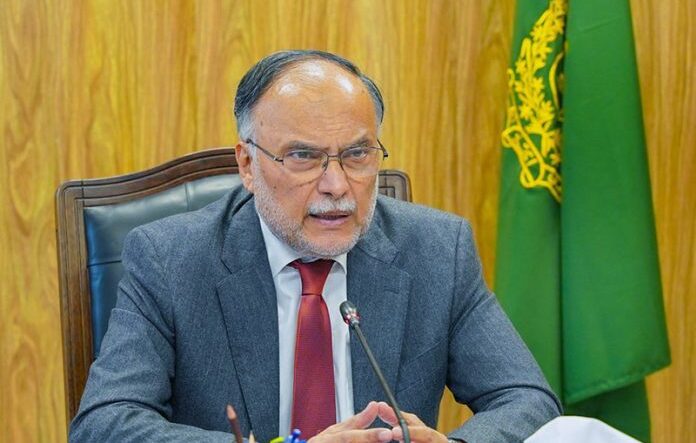ISLAMABAD: Pakistan’s Minister for Planning, Development and Special Initiatives, Ahsan Iqbal, on Tuesday reaffirmed Pakistan’s commitment to regional economic integration, urging a transition from political hostilities to mutual cooperation to unlock South and Central Asia’s economic potential.
Speaking at the launch of a report titled “Examining the Feasibility of an East-West Economic Corridor for South & Central Asia” at the Islamabad Policy Research Institute (IPRI), Iqbal said Pakistan envisions a regional framework of trade, transport, and digital connectivity linking Central Asia, Afghanistan, Iran, Pakistan, and India.
“The idea of an East-West Economic Corridor is not new,” Iqbal said. “But it is time to move from aspiration to action. That requires political will and mutual trust.”
The proposed corridor is a central element of Pakistan’s broader geo-economic strategy under the national development initiative “Uraan Pakistan.” Iqbal highlighted Pakistan’s current efforts to prepare for regional integration, including upgrades to the Gwadar deep seaport, the expansion of the Main Line-1 (ML-1) railway, and digitalization of border crossings with Afghanistan and Central Asia.
However, the minister emphasized that economic connectivity cannot flourish without regional peace. “Connectivity cannot thrive in an environment of coercion, occupation, and hegemonic ambition,” he said, stressing that “Pakistan stands for peaceful coexistence, regional integration, and mutually beneficial cooperation.”
Iqbal blamed India for stalling regional cooperation, citing its 2019 revocation of Article 370 in Jammu and Kashmir, the deadlock of the South Asian Association for Regional Cooperation (SAARC) since 2016, and the recent suspension of commitments under the Indus Waters Treaty.
“These actions reflect an irresponsible and inconsistent attitude toward regional cooperation,” he said. “Corridors cannot grow while borders are blocked. Access to markets cannot happen when treaties are suspended.”
Despite ongoing challenges, Iqbal said Pakistan has acted with maturity, noting the quick resumption of Afghan transit trade during recent tensions as a gesture of goodwill.
“Connectivity requires trust, and trust cannot be built with fencing, fire, or force. It must come through honest engagement and responsible statecraft,” he said.
The minister also pointed to the China-Pakistan Economic Corridor (CPEC) as a successful model of cooperation. He credited the project with revitalizing Pakistan’s energy systems, creating a modern transportation network, and delivering concrete development outcomes. He stressed that future regional initiatives must be guided by the same principles: transparency, inclusivity, and strategic alignment.
“Pakistan welcomes the participation of all partners—regional or global—as long as engagements are based on mutual respect and shared benefit,” he added.
Iqbal drew parallels to global trade relations, highlighting how economic engagement can persist despite political tensions. “Look at the United States and China. Despite strategic differences, they remain each other’s largest trading partners. The key is respect for sovereignty and adherence to treaties.”
He criticized India’s use of anti-Pakistan rhetoric during election seasons. “Every time India approaches an election, we see a surge in border tensions and hate speech. This is not the sign of a confident nation,” he said. “It’s a sign of deep insecurity.”
Calling for a reset in regional relations, Iqbal said, “This is not just about India and Pakistan. This is about the future of South Asia. Without peace, there will be no prosperity.”




